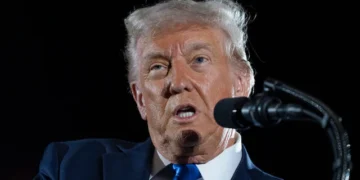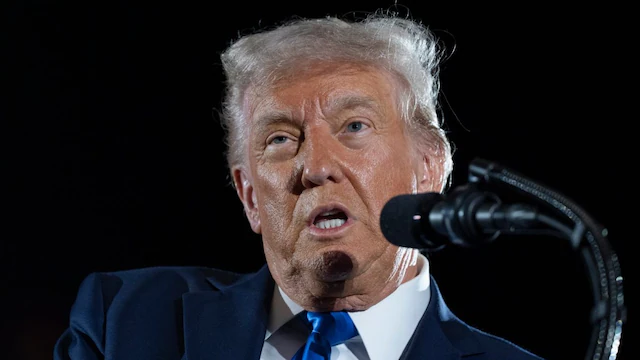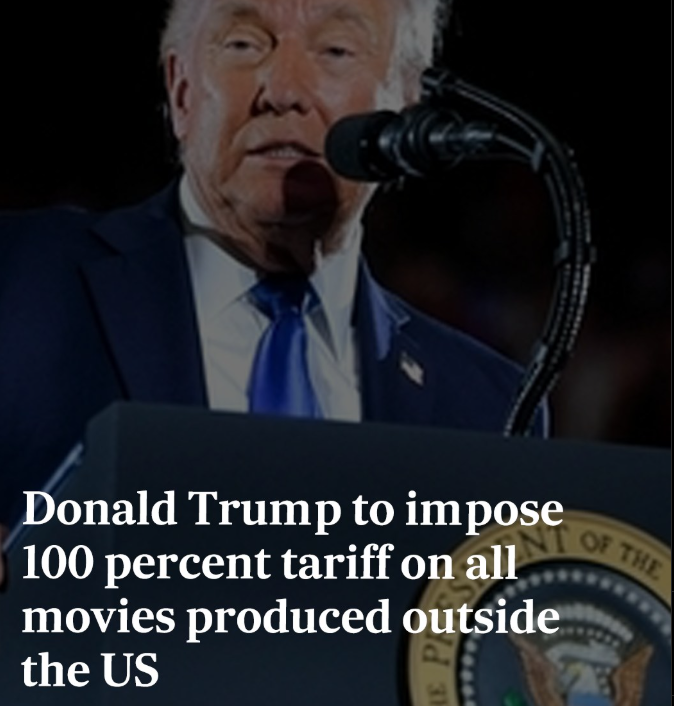Washington D.C., April 29, 2025 — Donald Trump announced a sweeping 100% tariff on all foreign films entering the United States, citing national security concerns and accusing other nations of “stealing” American filmmakers and studios.
Trump made the announcement as part of his broader America First economic strategy. He argued that foreign governments, particularly in Europe and Asia, have been offering lucrative subsidies and incentives to lure U.S.-based film talent and production companies abroad, thereby undermining the U.S. film industry — one of the nation’s most iconic cultural and economic assets.
“They’re not just stealing our jobs anymore,” Trump declared. “They’re stealing our directors, our producers, our actors — the heart and soul of Hollywood. And we’re not going to take it.”
Justification: National Security and Cultural Sovereignty
Trump framed the issue as a matter of national security, claiming that foreign influence in the media space poses a long-term threat to American values and cultural integrity.
“Movies are powerful. They shape how people think. When foreign countries are controlling the content and production, they control the message,” Trump stated. “We can’t allow propaganda from foreign interests to be piped into our homes and theaters under the guise of entertainment.”
The tariff will apply to all foreign-produced films, regardless of language, budget, or distributor. This includes films from traditional U.S. allies such as the United Kingdom, France, South Korea, and India — all of whom have strong cinematic ties with Hollywood.
Industry Backlash
The announcement sparked immediate backlash from across the entertainment industry. Independent distributors, film festival organizers, and cinema chains warned that the move could severely disrupt global film exchange and cultural diplomacy.
Jane Rodriguez, executive director of the American Film Export Council, called the decision “unprecedented and economically self-destructive.”
“This will not protect American films. It will isolate them,” she said. “Independent cinemas thrive on foreign content. This will hurt small theaters, limit audience choices, and provoke retaliatory measures from other countries.”
Foreign governments are also expected to respond. Several international film bodies have condemned the proposed tariffs and warned of potential countermeasures, including limiting the distribution of American films in their domestic markets — a move that could severely impact U.S. box office revenues abroad.
Hollywood’s Mixed Reaction
Within Hollywood, reactions have been mixed. While many high-profile actors and directors condemned the tariffs as “xenophobic” and “culturally regressive,” a small but vocal group of conservative filmmakers have applauded the move.
“We’ve been undercut for years,” said Jack Harmon, a right-wing filmmaker and vocal Trump supporter. “Studios have outsourced post-production to Eastern Europe. Tax havens in Canada are draining our economy. It’s time we brought American filmmaking back home.”
However, mainstream industry players including major studios like Warner Bros., Disney, and Paramount have expressed concern, fearing this could disrupt global partnerships, co-productions, and international market access.
Legal Challenges and Implementation
Legal experts say Trump’s justification under the guise of national security may provide a legal pathway to impose the tariffs under the Trade Expansion Act of 1962, which was previously invoked to impose steel tariffs during his first term.
Still, critics argue that equating film imports with national security is a stretch, and legal challenges are expected.
Implementation of the tariffs, if Trump is reelected, would likely begin early in 2026. His campaign has vowed to work with Congress to codify new protections for American media industries and penalize companies that take productions abroad using foreign tax incentives.
A Global Cultural Standoff?
The proposed policy marks a dramatic escalation in Trump’s broader economic nationalism and signals a willingness to weaponize cultural imports in a way never seen before in American politics. Some analysts fear it could spark a global cultural standoff, where films — once considered a bridge between nations — become tools of economic and political warfare.
Whether the move will energize his base or alienate moderate voters remains to be seen. But what is certain is that Trump’s latest declaration has turned the silver screen into a new front in the battle over globalization, national identity, and economic control.
Table of Contents
Read Also
India on High Alert to Prevent Pakistan’s Attempt to Access Global Markets 2025















 Categories
Categories










